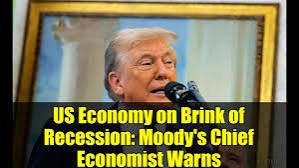US Economy On Brink Of Recession, Warns Moody's Chief Economist

US Economy On Brink Of Recession, Warns Moody's Chief Economist
Date : 05-09-2025
Posted By : Intellex Strategic Consulting Private Limited
US Economy On Brink Of Recession, Warns Moody's Chief Economist
The economy is very close to a recession, based on data about spending, jobs, and manufacturing, he said, adding that he is worried about US tariffs hurting American companies' profits and ongoing troubles in the US housing market.
The state-level data in the US shows that the country is "on the edge of recession", said Mark Zandi, chief economist at credit rating agency Moody's.
According to Zandi, who was among the first economists to predict the 2008 financial crisis, the states that make up nearly a third of the US gross domestic product (GDP) are currently either in recession or at high risk of entering one.
Based on analysis by Moody's chief economist Mark Zandi, the US economy is on the brink of a recession due to stagnant consumer spending, a deteriorating labor market, and other economic headwinds. Zandi's assessment is based on state-level data showing that states comprising nearly one-third of the US gross domestic product (GDP) are already in or at high risk of a downturn.
Key indicators of recession risk:
Stagnant consumer spending: Consumer spending, which drives a significant portion of US economic activity, has flatlined in 2025, a level not seen since the 2008–2009 financial crisis. This stagnation points to reduced purchasing power and broader economic weakness.
Deteriorating labor market: The labor market is cooling, with significant downward revisions to job growth figures in recent months.
Stalled employment: Zandi notes that payroll employment growth has nearly stalled since May 2025.
Widespread job cuts: Over 53% of US industries tracked are now shedding jobs, a condition historically indicative of a recession.
Diminished workforce: The labor force participation rate has gone sideways, and the foreign-born workforce has declined due to restrictive immigration policies.
Rising inflation: While overall inflation has moderated, core inflation remains above the Federal Reserve's target. Zandi predicts the annual inflation rate could climb from 2.7% to nearly 4% by next year, eroding household purchasing power.
Troubled sectors: The manufacturing and construction sectors are contracting at an alarming rate. The housing market also continues to face significant challenges.
Impact of tariffs: Increasing tariffs are squeezing American company profits, raising prices for consumers, and hurting the overall economy. This pressure could act as a final trigger for a recession.
Differing perspectives on the economic forecast
Not all economists share the same level of pessimism as Zandi. Several major financial institutions present a more cautious, but less certain, outlook.
UBS: The global investment bank reported a 93% recession risk based on "hard data" for May to July 2025 but does not officially forecast a recession. UBS predicts "soggy growth" for the rest of 2025, with a possible recovery in 2026.
J.P. Morgan: In May 2025, J.P. Morgan lowered its probability of a US recession in 2025 from 60% to 40%. The firm expects "material headwinds to keep growth weak through the rest of this year," but no outright recession.
Morgan Stanley: The bank's mid-2025 outlook predicts a global growth slowdown in 2025 but expects the US to avoid a recession. The forecast is based on the assumption that trade negotiations will proceed without further tariff escalations.
Consensus forecasts: A survey of economists by the Securities Industry and Financial Markets Association (SIFMA) found an average expectation of 1.9% GDP growth in 2025, suggesting continued but slower expansion.
What this means for average Americans
If the US economy does enter a recession, Zandi and other analysts predict it would most likely appear as follows:
Higher prices: Persistent inflation will make everyday purchases more expensive and harder for consumers to ignore.
Job disruption: Industries related to food, goods, and transportation could see significant job losses. While overall unemployment has remained low, underlying weaknesses in hiring suggest employers are bracing for tougher times.
The next few months of economic data, particularly surrounding jobs and inflation, will be critical in determining whether the US can avert a recession or if the current risks prove too great to overcome.
Categories
- All Category
- Investment Opportunities
- Loans And Finance
- Business Opportunities
- Startup India
- Banking And Finance News
- Franchise & Dealership Network Development
- Real Estate (Residential, Commercial, Warehousing etc)
- Statutory Compliances & Taxation
- Hospitality Business Opportunity - Hotels, Resorts, Restaurants etc
- Jobs and Employment Opportunities
- Personal Finance
Latest Blogs
AU Small Finance Bank – Empowering Business Growth with Tailored Financial Solutions
Date : 09-11-2025
Posted By : Growmoreloans.com
Unsecured Business Loans up to ₹10 Crores under CGTMSE Scheme . No Collateral Required!
Date : 09-11-2025
Posted By : Growmoreloans.com
CGTMSE guaranteed Unsecured Working Capital Loans to MSMEs in India
Date : 02-11-2025
Posted By : Growmoreloans.com
Profectus Capital—Educational Institution Loans Made Simple
Date : 31-10-2025
Posted By : Growmoreloans.com
Credit Card Debt Trap: A Wake Up Call for Financial Discipline
Date : 29-10-2025
Posted By : Growmoreloans.com